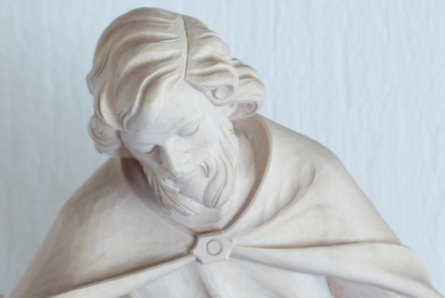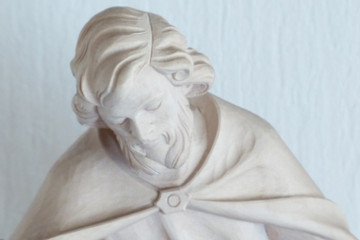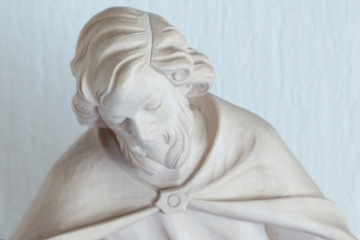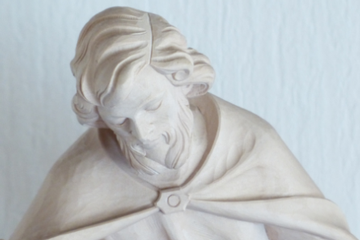
Reflection presented by Cardinal Joseph W. Tobin, C.Ss.R.
The Lay Centre and Immaculate Conception Seminary School of Theology of Seton Hall University (ICSST) invite you to join us for our final reflection and dialogue with Pope Francis’ apostolic letter “Patris Corde.”
Our series, which started on the feast of St. Joseph, March 19, concludes on the feast of St. Joseph the Worker, May 1.
In his apostolic letter, Pope Francis speaks of St. Joseph, the carpenter, who not only worked honestly to take care of his family, but also taught Jesus “the value, the dignity and the joy of what it means to eat bread that is the fruit of one’s own labour” (“Patris Corde,” 6). The Holy Father concludes: “The loss of employment that affects so many of our brothers and sisters, and has increased as a result of the COVID-19 pandemic, should serve as a summons to review our priorities. Let us implore St. Joseph the Worker to help us find ways to express our firm conviction that no young person, no person at all, no family should be without work!”
In this fourth interview of the series “In the School of St. Joseph,” how do we face these difficult times with creativity, when everything presses us towards stillness? Through his fiat, like Mary, Joseph accepted the path that God had laid out for him. He served not only Jesus and Mary, but all of humanity. Can we also put this creative obedience into practice in relationships and in daily life? How?
In his apostolic letter “Patris Corde,” Pope Francis says, “Joseph is certainly not passively resigned, but courageously and firmly proactive. In our own lives, acceptance and welcome can be an expression of the Holy Spirit’s gift of fortitude. Only the Lord can give us the strength needed to accept life as it is, with all its contradictions, frustrations and disappointments” (“Patris Corde,” 4).
We hope the accompanying insights into sacred art depicting St. Joseph, offered by Dr. Barbara Aniello, will enrich your journey. The fourth work of art is “The Flight into Egypt,” by Giotto di Bondone.
We invite you to read below the responses to questions posed to Cardinal Joseph Tobin, C.Ss.R., in the last in this series of brief interviews on topics to guide us in this Year of St. Joseph.
Cardinal Joseph W. Tobin, C.Ss.R., is the archbishop of Newark, New Jersey, and Lay Centre board member. Pope Francis recently named Cardinal Tobin as a member of the Congregation for Bishops.
We often reflect on Mary’s fiat, but in “Patris corde,” Pope Francis also mentions Joseph’s fiat, that is, his full acceptance of God’s will in very challenging moments of his life. If we were to compare Mary and Joseph’s “fiats,” in terms of courageous acceptance, what do they have in common and how are they different?
Cardinal Tobin: St. Alphonsus Liguori, the founder of the Redemptorist missionaries, my religious family, wrote: “Perfection is founded entirely on the love of God: “Charity is the bond of perfection;” and perfect love of God means the complete union of our will with God’s.” Both Mary and Joseph showed that love is more than words. Thank goodness because, while Mary spoke her fiat, there is no record of any word spoken by the blessed spouse of the Virgin Mary!”
We look to their lives to see how one lives the will of God in holiness. God’s saving plan was revealed to Joseph in four dreams, each of which provoked an obedient response from the carpenter of Nazareth. Despite his initial misgivings, he lovingly took Mary into his home (Mt 1:20); after a dream, he fled with Mary and Jesus into exile in Egypt (Mt 2:13); following the death of Herod, the divine messenger instructed Joseph to return with his family to Israel (Mt 2:19); finally, he followed instructions received in a dream and led his family to their home in Nazareth (Mt 2:22).
Everyone remembers Mary’s dramatic acceptance of God’s saving plan, when she replied to the divine messenger, “Behold, I am the handmaid of the Lord. May it be done to me according to your word” (Lk 1:38). However, like Joseph, her love for God was more than talk. At crucial moments in her life’s journey, the Gospel of Luke remembers that Mary “kept all these things, reflecting on them in her heart” (2:19). At the wedding feast in Cana of Galilee, she instructed the servants — and us — to “do whatever he tells you” (Jn 2:5). She stood beneath the Cross of her dying son and received her commission to be our Mother (Jn 19:26).
Joseph and Mary lived that perfection of love that is uniting one’s will with God’s saving plan. They did not only “talk the talk”; they walked the walk.
We live in times of great “contradictions, frustrations and disappointments.” How do you think the model of Joseph can be a source of guidance and inspiration?
Cardinal Tobin: C. S. Lewis wrote in “Mere Christianity” that pride is the “anti-God” state, the position in which the ego and the self are directly opposed to God: “Unchastity, anger, greed, drunkenness, and all that, are mere fleabites in comparison: it was through Pride that the devil became the devil: Pride leads to every other vice: it is the complete anti-God state of mind.”
Pope Paul VI, in his homily for the feast of St. Joseph in 1969, used the word “humble” six times in referring to the foster father of Jesus. He wrote, “St. Joseph is the model of those humble ones that Christianity raises to great destinies, and he is the proof that in order to be good and genuine followers of Christ there is no need of ‘great things’; it is enough to have the common, simple, human virtues, but they need to be true and authentic.”
Joseph’s humility was rooted in an unshakeable trust in the faithfulness of God. That trust opened him to the strength God was offering him. Joseph knew that “all things work for good for those who love God, who are called according to his purpose” (Rm 8:28). So, since he trusted in God, who had called him, he could face disappointment, insecurity, exile and death, believing that God would bring good from them.
Joseph is considered a “creatively courageous father” in the pope’s letter. He found ingenious ways to protect his family. How can our creativity be similarly nurtured when facing “the things in life we did not choose?”
Cardinal Tobin: My dad, whose name was Joseph, was a loving husband and a hard-working father of a house full of kids. As a child, I noticed that he did not bring “work from the office,” like the dads on TV. When I asked him why he did not return at night with a stack of papers, he replied: “Because I married your mother. I didn’t marry General Motors.” Accepting his vocation, he was defined by his choices and received the courage to face the things in life he did not choose.
If we believe that God has “called us out of darkness into God’s marvellous light” (1 Pt 2:9) and commissioned us to be witnesses to that light, we can trust that we will be given all we need to live faithfully our mission.
Joseph cultivated a deep relationship with God throughout his life and was open to receive God’s gift of being the person who would help educate Jesus, the Messiah. In this relationship, Joseph was not in control and this was fine because he trusted the One in control. He knew the Law given by God to God’s people, he was faithful to it, yet he was open to God’s surprise. The law was not a god for Joseph, just a means to God. Only God was God. His heart was open. He trusted in God’s faithfulness and held on tight to the angel’s words: “Don’t be afraid.”
Thinking of people who struggle today, as did the Holy Family, and the reasons for their struggles, do you see any concrete situations that bother you particularly and which we should urgently and creatively address?
Cardinal Tobin: The great drama of our times is played out across the world in the lives of refugees and migrants. The World Health Organization estimates there are 1 billion migrants in the world today, of whom 258 million are international migrants and 763 million internal migrants — one in seven of the world’s population. Sixty-eight million of the world’s internal and international migrants are forcibly displaced today.
While numbers can suggest the enormity of this drama, there is a danger of reducing human beings to faceless statistics.
In Joseph, Mary and Jesus, a migrant family has a “face.” This family shared in the sufferings of those who flee from the hatred of the powerful, and we ask them to console and protect all our brothers and sisters driven by war, poverty and necessity to leave their homes and their lands to set out as refugees for safer places.
Through the intercession of St. Joseph, we ask God to help us to recognize the faces of migrants and refugees today, to help them to find the strength to persevere, and to give them comfort in sorrows and courage amid their trials.
Grant to those who welcome them some of the tender love of this just and wise father, who loved Jesus as a true son and sustained Mary at every step of the way.
May Joseph, who earned his bread by the work of his hands, watch over those who have seen everything in life taken away and obtain for them the dignity of a job and the serenity of a home.
We began the series on the Solemnity of St. Joseph, March 19 and we end on May 1, the Memorial of St. Joseph the Worker. The Church has spoken widely in its teachings about the reality, dignity and importance of work. Based on that, what can we tell the millions of women and men worldwide who are unemployed, struggle to find work or who are exploited?
Cardinal Tobin: When pondering Jesus, it is easy for Christians to focus on his divinity and to forget the ways in which Jesus shared our humanity. Joseph was a carpenter and our tradition tells us that Jesus was formed by his foster-father in this same trade, which meant hard work, an attention to detail, patience and diligence.
Joseph provided for his family as a craftsman who did not earn a lot of money. When they went to the Temple, for example, Joseph offered two doves, which was an allowance for those who could not afford a greater sacrifice. Nevertheless, Joseph was filled with faith—he responded immediately to the promptings of angels in his care for Mary and Jesus, even when he did not understand why. He was also filled with love—he had tender regard for Mary, even when it appeared that she had been unfaithful to him, and he loved Jesus as his own son and shared with him his trade. In Mark’s gospel people won’t believe Jesus because he is known as “the carpenter.” Matthew’s Gospel calls Jesus “the carpenter’s son” (Mt 13:55).
In the Catholic tradition, workers are not some sort of commodity called “workforce,” like energy, raw materials, etc. We believe that human work continues the creative initiative of God and efforts to improve the conditions of human living are in keeping with God’s purpose. It is not God’s will that people be unemployed, exploited or marginalized. The best message to speak to people who suffer injustice will be our efforts to “walk the talk” that recognizes human dignity, the value of work and an unshakeable belief that God still hears the cry of the poor.


